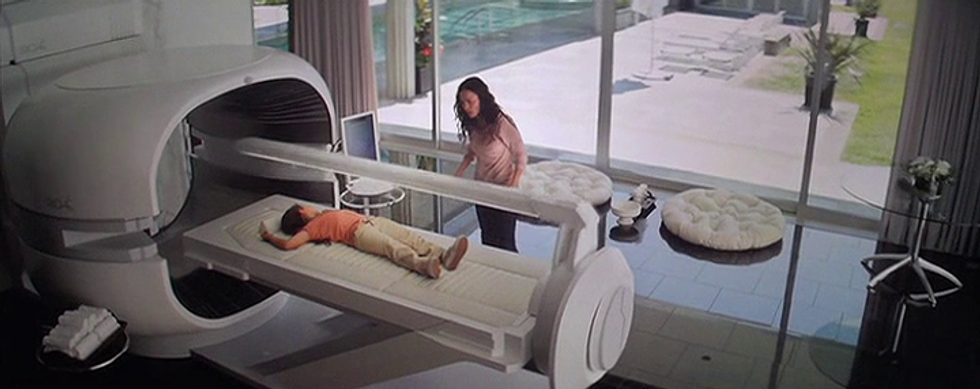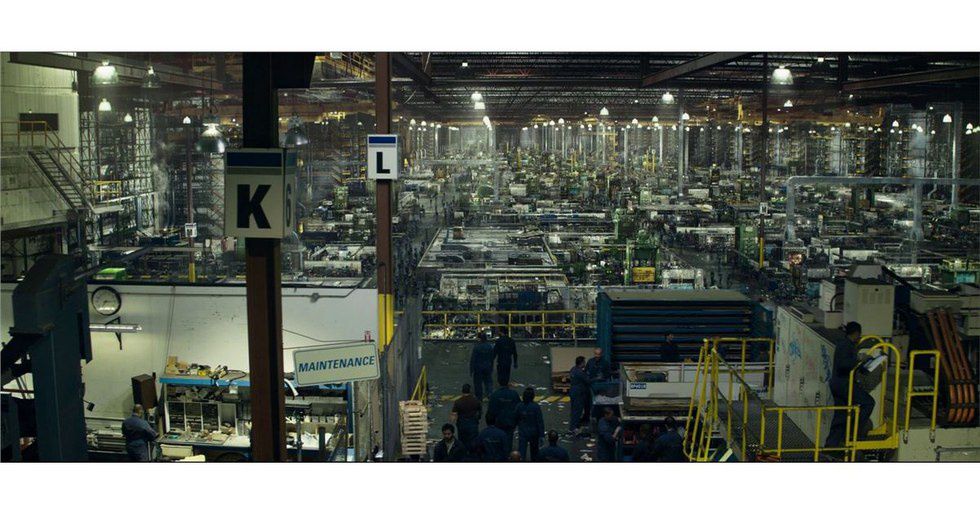Elysium Movie Poster via impawards.com
I often get asked why it is that I am so involved in social justice movements such as fighting for a living minimum wage, access to affordable healthcare, or anything that has to do with socioeconomic status in America. Of course, I have a plethora of reasons. Yes, I have vivid memories of going with my mom to pick up our monthly allotment of food stamps as a child – the rooms were always crowded. I was so young that I didn’t know that there was social stigma attached to that day of the month that we picked up the funny looking “money” that would make it so that my family could have at least hamburger helper, or mac and cheese and hotdogs with canned green beans. I always hated those canned green beans. They were waxy and slimy and filled with sodium; I could not understand why my mom was so adamant that I eat some sort of green vegetable (I get it now. Thanks, Mom, for always trying to make the best of whatever situation we were in!). The “money” itself looked weird, green and brown and blue. I didn’t realize that it wasn’t really money; I just knew that it got us food. I did “know,” thanks to some privileged and rude adults, that people with food stamps only tried to trade them in for alcohol and cigarettes. I remember piping up once in a classroom that my mom and dad didn’t drink or smoke, and being confused as to why my teachers looked embarrassed. I got punished for eavesdropping. The first time that I saw Canadian money I couldn’t help but think back to walking out of the center with my mom carrying a brown cardboard box filled with lima beans, dehydrated milk, other cans, and her purse with play money. I was happy, but at that age didn’t understand why the adults around me weren’t. Sadly, over time, I learned.
For some reason, even many of the people who know my history and my personal relationship with socioeconomic issues still don’t understand why it is personally hurtful when I hear opinions against things like affordable healthcare for everyone. I can’t help but think that maybe if my parents weren’t paying off my dad’s hospital bills for so long that they would have had less stress in their lives that would have contributed to a more harmonious home life, to put it nicely. Maybe my experiences would have been different if women’s work outside of the home weren’t so devalued compared to men’s: my mom could have brought home more money to help catch up on those hospital bills that they paid on until well after their youngest child (me) moved out. Maybe my parents would have been able to invest in cars that weren’t always falling apart if the government didn’t see them as leaches that needed to be cut from the rolls with a 2nd income of a minimum wage that was less than $5/hour for a significant portion of my life.
The world of Elysium is not a future that I want for my children. I know, woah! Where did that come from, right? How can I go from talking about my reality growing up (which is nothing compared to what many more people are dealing with today – just being realistic) to talking about a sci-fi movie starring Matt Damon? Stick with me now, it’ll all make sense in a minute.
Elysium Healing Machine via geekapolis.fooyoh.com
The general plot of Elysium is this (hey, that means SPOILERS!): At the end of the 21st century, the Earth’s elite create a space station and flee the diseased planet to live a life of health and abundance. Elysium is a wealthy utopia where technology is more advanced than on Earth. There are machines in every home that cure any disease/disability, needing only to scan the citizen’s implanted identity chip before healing them. “Illegal immigrants” from Earth who pay for a shuttle and a fake identity chip in hopes of sneaking in for just a minute or two in one of the healing chambers sometimes gain access, but are almost always killed or deported immediately. The story of Elysium can be analyzed as a futuristic metaphor for today’s society through the ideas of social stratification, social inequality, and deviance.
Max, the main character played by Matt Damon, is one of the many impoverished people living on Earth. Despite being a good person, he became involved in crime at a young age. Max’s criminal deviance stems from the thought that the only way he could save enough money to gain passage to Elysium was through crime. Max’s life continued to be associated with crime, but as he got older he tried to turn a new leaf and began working under dangerous conditions at a factory. Mainstream culture saw this as something that was ideal for the “lower end” of the human species that was left on earth. The factory employees are always under the fear that they will lose their job (and lose access to the meager survival that job affords them) due to overpopulation, massive poverty, and the fact that there were so many people willing to replace them. Any of this sound familiar? If you’re a part of the lower middle class, working class, or anything below that in America, this might just be your day-to-day life. Max is a part of the underclass, a group that is serving as a labor reserve to keep wages low and the ruling class rich.
Elysium Photo via agonybooth.com
The Elysium space station perpetuates a consistent state of social inequality. If one was lucky enough to have been wealthy when Elysium was first created, their lineage is guaranteed continual citizenship on Elysium. Since everything is curable through the healing chambers, it is even possible that the people who live on Elysium are immortal – or at least living much longer lives than those living on Earth. This is comparable to wealthy members of first world countries now and their ability to buy better life chances. There are members of the “underclass” who die from curable ailments that they simply cannot afford to treat, while members of the upper class can make it to the other side of major illnesses such as HIV because of the access to medical attention that their money provides them. As Americans, we watch people die from starvation and curable illnesses every day. While we may not have invented the “cure all” machines that exist on the Elysium space station yet, we have made major medical advances in the past 100 years that should be benefitting everyone. Yet for some reason, a large portion of our population lives in an America that has never granted them access to the healthcare that they so desperately need.
This lack of access comes from outrageous pricing of medical care to a government system that allows companies to pay their employees less than a living wage while they toil in the production and distribution of luxuries that they can’t afford. With social control in Elysium, as often happens in our society, those below middle class experience Marx’s idea of alienation. Many people living on Earth’s surface work in factories that are owned by the bourgeoisie from Elysium. The labor of the working class is what allows Elysium to continue functioning, but the laborers are granted no access to the products that they toil to produce. There is a strictly regulated segregation of the classes, the penalties for crossing class lines ranging from deportation to death. This segregation is enforced through members of the power elite on Elysium, such as the Secretary of Defense who makes a play to try and become the President through violent tactics and no regard for the lives of the “illegals” that she shoots down or deports to Earth without allowing them access to the healing chambers. It could be argued that this character’s stance is the same as many Americans today who want to build a wall to keep immigrants out, or refuse aid to refugees who are fleeing similar Earthly conditions as those depicted in this film. Trump would very likely jump at the chance to put outer space in-between American and other countries. Elysium’s advanced technology includes extremely strong robots that not only police the surface of the Earth, but that also keep order on Elysium. The robots are programmed for the good of Elysium’s citizens, and treat everyone who is not a citizen as disposable, as do many of their human counterparts. This ideal can also be compared to immigration enforcement today, where those who apprehend immigrants and deport them often treat “illegals” in America as if they are not even human.
Elysium Factory via icollector.com
After Max is incurably radiated, the dehumanization that he experiences from his manager and the CEO of the company (a member of the power elite on Elysium) cause Max to reach a breaking point. Max is treated as completely disposable, and worth less than the little bit of money his accident would cost or save the company. While Max had always dreamed of getting to Elysium, he had given up trying, but now knew that a healing chamber was his only hope for survival. The cultural universal depicted here is the will to survive. Max returns to the deviant ways of the underground economy in hopes that he can catch a ride to Elysium to stay alive. Max’s motivation is not one of revolution, but of self-preservation. In the process of trying to secure his flight to Elysium by trading one crime for another, Max steals the resources to level the playing field and make every human a citizen of Elysium. While Max’s motives are still selfish at this point, his interactions with an old friend remind him of the injustice that is their reality. When Max makes it to Elysium, it is along with help from other “deviants” that he is able to defeat Elysium’s system. Max sacrifices his own life to make everyone citizens of Elysium. The robots are no longer hostile to the “illegals” because they have finally achieved universal citizenship due to Max’s ultimate sacrifice, and must be protected.
Elysium is another story of society being saved by the deviants that it tries to control through stratification and inequality. While Elysium is a future that could be very realistic, the resolution is too idealistic. That one event could so drastically change society so quickly, and on such a large scale, is sadly the most unrealistic point in the movie. Elysium’s ending idealism is reminiscent of notions that electing one individual will quickly change all of the class conflicts, suffering, and general inequalities we face today. Max’s sacrifice would have likely started a chain reaction of change that may not have been stoppable altogether, but would have at least been slowed by the elite trying to preserve some semblance of their power.
Elysium Photo via okmagazine.com
As a country, and on a global level, we can’t wait to even the playing field when it comes to the living conditions of our fellow humans. While we may not have the extremities that are depicted in the movie Elysium today, if we don’t start making changes we will continue down that road of inequality. While we don’t need to make Max’s ultimate sacrifice to change our world, we do need to educate ourselves and organize against the hate, corruption, and greed that have overtaken our society. There is no reason why people shouldn’t have real access to healthcare. There is no reason why anyone in one of the richest countries in our world should go to bed hungry at night. There is no reason why equality shouldn’t be winning, and yet it has been losing for years. I know the idea of an apocalyptic society is all the rage right now, but we shouldn’t be working toward creating suffering that we can prevent. While we might not be able to stop a zombie contagion, we can make sure that Elysium is just fiction, and not a fulfilled prophesy.
























